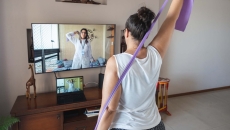physical therapy
The partners will work to bring AI-powered motion-capture technology to the physical therapy market in order to reduce administrative workloads.
However, researchers found the blended approach did have a greater impact on fear-avoidance beliefs and patients' reported adherence to at-home exercises.
Last year, digital musculoskeletal care and physical therapy companies raked in plenty of investor dollars. Startups say the expensive MSK health sector is ripe for innovation.
It also seeks to expand its base in India and boost product development.
Hinge said more than $1 billion has been invested in the company thus far.
In this episode of the Virtual Care Paradigm, Kiio CEO Lydia Zeller shares how virtual is being used to advance the physical therapy/musculoskeletal space.
The combined entity now stands as the largest virtual physical therapy technology provider in terms of revenue and customer base, per Physitrack's CEO and cofounder.
Alongside the purchase and service launch, the digital health company also shared news of a $57 million investment from Perceptive Advisors.
5Lion Ventures led the round with participation from Hospital for Special Surgery and ID Fund.
Shawn McKee, VP of marketing at WebPT, discusses the challenges physical therapy facilities face as more and more move to EHRs.





